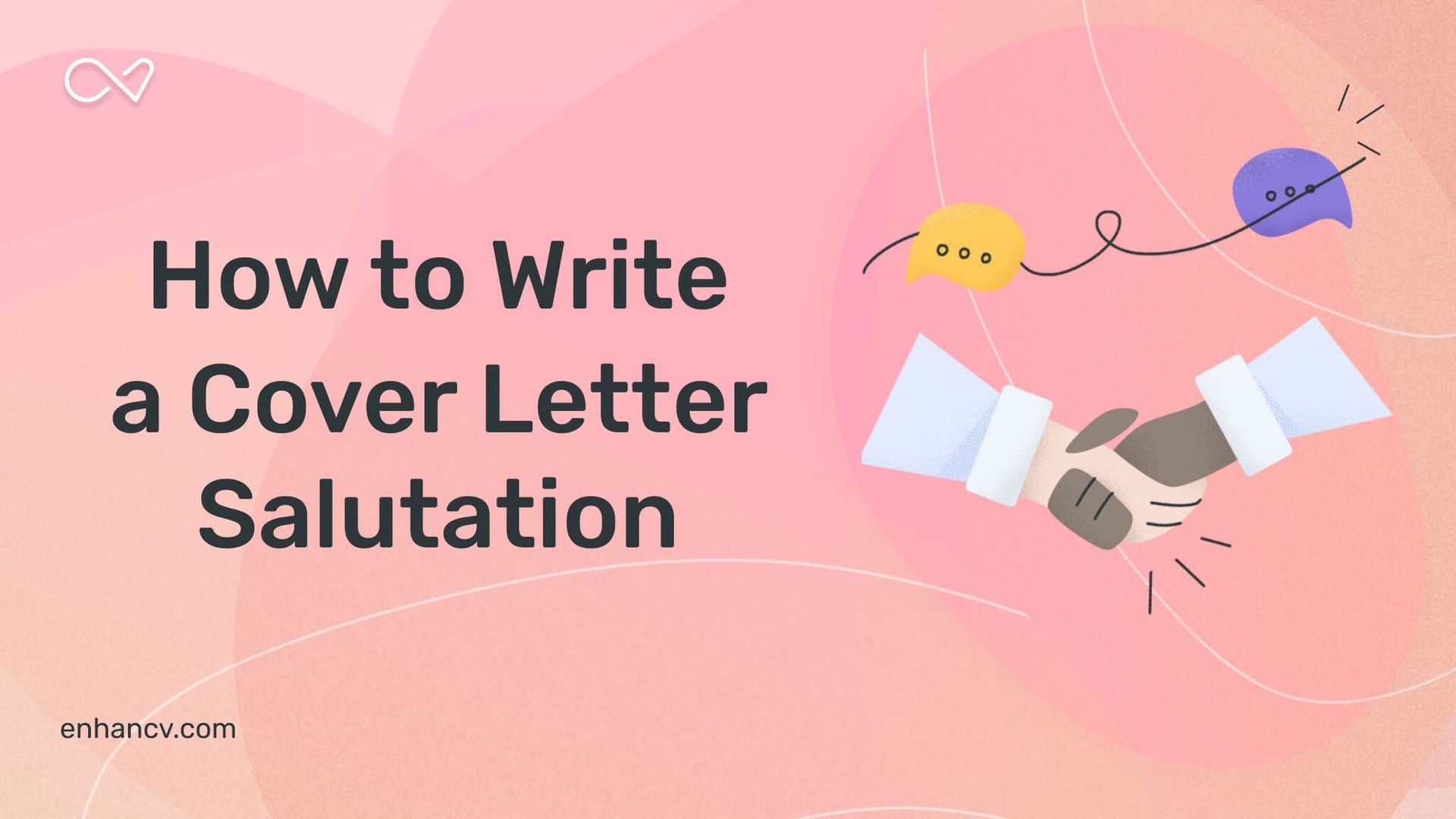The cover letter salutation is the greeting you use to open your cover letter. Along with your document’s header, it’s one of the first things a hiring manager sees—and it plays a bigger role than most candidates realize. Choosing the right salutation based on who you’re addressing helps set the tone, signals professionalism, and shows that you’ve put thought into your application from the very first line.
In this guide, we’ll walk through how to choose the best salutation for your situation and share clear cover letter greeting examples you can use with confidence.
Key takeaways
- Addressing a cover letter correctly shows effort and professionalism.
- Use full names or appropriate titles—avoid first names unless clearly appropriate.
- When the name is unknown, role- or team-based salutations work best.
- Keep salutations professional, neutral, and free of gender assumptions.
- Always separate your salutation from the body text with a blank line for clarity.
If you need help creating your cover letter, try Enhancv’s Cover Letter Builder. It’s the perfect cure for writer’s block.
Why your cover letter salutation matters
Your cover letter salutation might be a small detail, but it plays into the psychology of hiring. Recruiting relies on evaluating candidate traits, skills, and cultural alignment—and part of that process is subconscious. Hiring managers may form early impressions based on signals like effort, attention to detail, and tone. That’s why, before anyone reads your experience or qualifications, your salutation already sets expectations.
A proper salutation for a cover letter can signal:
- Professionalism: It shows you understand workplace norms and communication standards.
- Personalization: Addressing the right person (or role) suggests you’ve done your homework, not sent a generic application.
- Tone: Whether formal or neutral, the salutation frames how the rest of your letter is read.
On the flip side, a vague or outdated greeting can come across as rushed or careless—even if the rest of your cover letter is strong.
PRO TIP
There’s also a practical balance to strike. While applicant tracking systems (ATS) don’t evaluate salutations—or cover letters—human readers do. Choosing the best greeting means staying professional and clear without overthinking it—something hiring managers tend to appreciate more than forced creativity.
How to choose the best salutation for a cover letter
The best salutation for a cover letter depends on one key factor: how much you know about the person reading it. When possible, addressing a real person is always preferable—it shows effort and immediately personalizes your application.
In most professional contexts, address the person you’re writing to by their full name. First-name-only salutations are typically reserved for close or casual communication. If you’re unsure about the recruiter’s marital status, it’s best to avoid titles like “Mrs.” and use their first and last name instead.
Use “Dear Jordan Lee,” instead of “Dear Jordan.”
Tips for finding the hiring manager’s name
If the job posting doesn’t list a contact person, a quick search can often uncover the right name. Try these options before defaulting to a generic salutation:
- Review the job description carefully: Some postings mention the hiring manager or team lead further down.
- Check the company’s website: Look at the “About,” “Team,” or department pages related to the role.
- Search on LinkedIn: Use the job title and company name to find relevant managers or team leads.
- Look at the company’s careers page or blog: Hiring managers often appear in team updates or interviews.
In more formal settings—such as academia, healthcare, government, or the military—it’s best to address the hiring manager using their official title if you know it. This shows respect for the role.
For example:
- Dear Dr. Martinez,
- Dear Captain Reynolds,
- Dear Professor Ahmed,
- Dear Associate Dean Collins,
- Dear Chancellor Wu,
When you don’t know the hiring manager’s name
Sometimes you just can’t find the hiring manager’s name, and that’s fine. The goal then is to stay professional without sounding generic. Choose a neutral, role- or team-based salutation, such as:
- Dear Hiring Manager,
- Dear Marketing Team,
- Dear Product Hiring Team,
- Dear Head of Engineering,
Email cover letters (E-notes)
When sending a cover letter directly in the body of an email, the salutation rules stay mostly the same, but the formatting is simpler. You don’t need a full address block or date, and the tone can be slightly more conversational while remaining professional.
Best practices for email cover letter greetings:
- Use the same salutation you would in a formal cover letter (“Dear Alex Morgan,” or “Dear Hiring Manager,”).
- Skip mailing addresses and jump straight to the greeting.
- Keep the opening line concise, as email cover letters are typically shorter.
Cover letter salutation examples
Below are a few cover letter salutation examples showing how to format and use different greetings depending on who you’re addressing. Each example demonstrates proper spacing, tone, and placement, so you can easily adapt it to your own cover letter.
January 10, 2026
Sarah Jones
Marketing Manager
Acme Corp
123 Market Street
New York, NY 10001
Dear Sarah Jones,
With over five years of experience leading digital campaigns and cross-functional projects, I’m excited about the opportunity to contribute to your team as Marketing Manager at Acme Corp.
In my current role, I’ve managed multi-channel marketing initiatives, collaborated closely with product and sales teams, and consistently delivered measurable growth. I’m particularly drawn to Acme Corp’s focus on data-driven decision-making and customer-first strategy.
I would appreciate the chance to discuss how my experience aligns with your goals. Thank you for your time and consideration.
Sincerely,
Alex Morgan
January 10, 2026
Ms. Laura Thompson
Operations Manager
Northwind Solutions
875 West Adams Street
Chicago, IL 60607
Dear Ms. Thompson,
With a background in process optimization and cross-team coordination, I’m excited about the opportunity to support your operations team as Operations Coordinator at Northwind Solutions.
In my current position, I’ve worked closely with stakeholders across departments, improved internal workflows, and helped streamline reporting processes. I value clarity and structure in my work, which aligns well with how your team operates.
Thank you for taking the time to review my application. I would welcome the opportunity to discuss how I can contribute to your organization.
Sincerely,
Daniel Perez
January 10, 2025
Dr. Robert Williams
Director of Research
Horizon Health Institute
410 Mission Bay Blvd
San Francisco, CA 94158
Dear Dr. Williams,
I’m writing to express my interest in the Research Analyst position at Horizon Health Institute. With a strong background in data analysis and academic research, I’m eager to contribute to your ongoing projects.
In my previous role, I supported longitudinal studies, analyzed complex datasets, and collaborated with interdisciplinary research teams. I’m particularly interested in Horizon’s work in public health outcomes and applied research.
Thank you for your time and consideration. I look forward to the possibility of discussing my application further.
Sincerely,
Maya Chen
PRO TIP
Always separate your salutation from the surrounding text with an empty line before and after it. This improves readability and keeps your cover letter looking clean and well-structured.
Proper and improper salutations for a cover letter
Cover letters can sometimes feel more flexible than resumes. However, that doesn’t mean anything goes—especially when it comes to your salutation. Using the wrong greeting can make your application feel careless or out of touch before a hiring manager even reads your experience.
Outdated salutations
Some greetings are technically correct but feel dated in today’s hiring landscape. Avoid options like “To Whom It May Concern” or “Dear Sir or Madam.” These can make your application feel impersonal and suggest minimal effort, especially when more neutral alternatives are available.
Overly casual greetings
Even at casual or startup-friendly companies, overly relaxed salutations can seem unprofessional.
Avoid greetings like “Hello!,” “Hi there,” or “Hey [Name].”
Gender assumptions
Guessing someone’s gender is risky and unnecessary, so unless you’re absolutely certain, go with a neutral option.
In some cases, people may use “Mx.” as a gender-neutral title—but only if you know the person prefers it.
When in doubt, skipping titles altogether helps keep your salutation respectful and inclusive.
Misspellings and name errors
Misspelling a name or title is one of the fastest ways to lose credibility.
As a rule of thumb, if you’re unsure, double-check the spelling or use a safer, neutral option.
Conclusion
Your cover letter greeting may seem like a small detail, but it plays a meaningful role in shaping first impressions. Whether you’re addressing a specific person, a team, or a hiring manager you haven’t met, a clear and professional greeting helps your application feel intentional and well thought out.
When in doubt, keep your salutation simple, accurate, and respectful—and focus on getting the basics right rather than overthinking the wording. A strong opening sets the stage for everything that follows.
If you want help creating your cover letter from start to finish, Enhancv’s Cover Letter Generator makes it easier to structure, write, and personalize your application, based on your resume.
Drop your resume here or choose a file.
PDF & DOCX only. Max 2MB file size.





